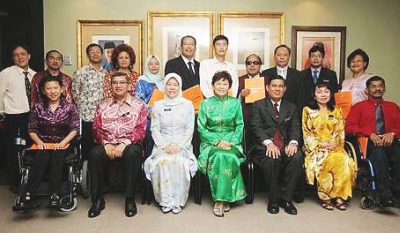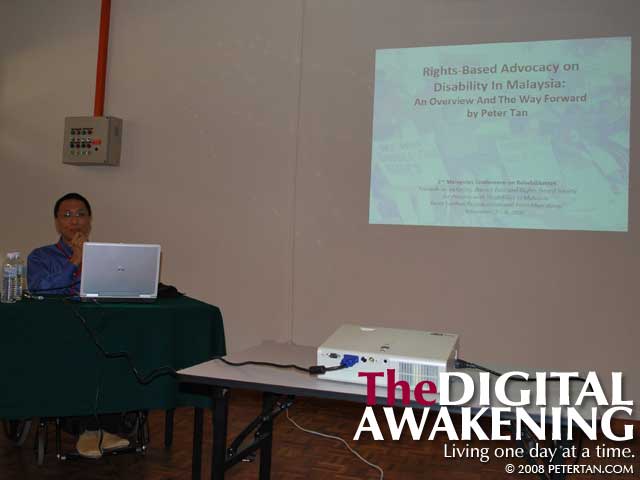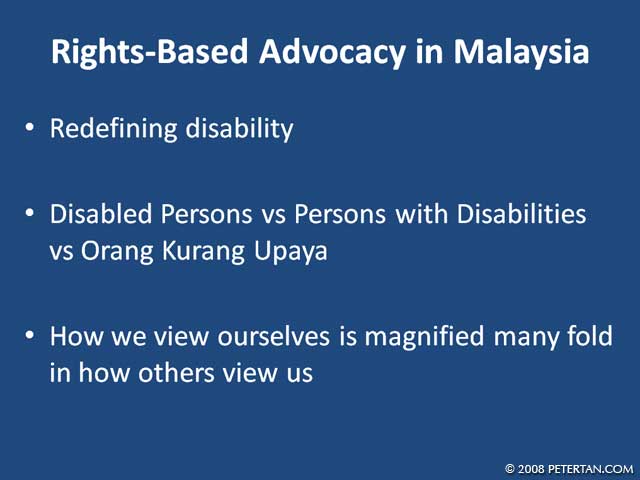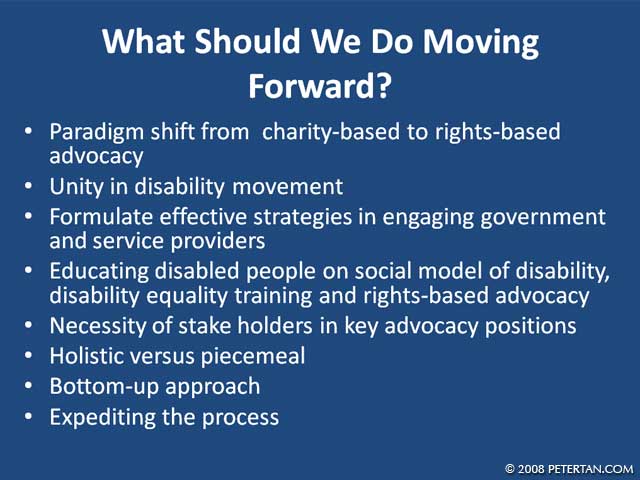There was a time when I would get all upbeat over such news in the mainstream media. Now, whenever I read about the government’s plans to alleviate the problems faced by disabled people, I get all skeptical. I have heard one too many empty promises made by politicians on such matters. I have also seen one too many leaders of disabled people’s organizations (DPOs) who sit in high-powered committees but do nothing to advocate for the rights of disabled people.
Nevertheless, I applaud Minister of Women, Family and Community Development Datuk Dr. Ng Yen Yen for realising that Malaysia needs to shift from the charity-based model to a rights-based one where the issues of disabled people are concerned. The charity-based model demeans the dignity of disabled people by reducing them to positions of passive recipients whose fate are dependent on the generosity of the benefactors.
Given a choice, disabled people do not want to be given fishes all the time. We want to learn to fish to be self sufficient. We want to be the master of our destiny. No man should decide how another person should live his life. Disabled people must be allowed to decide for themselves how they want to live their lives.
Disabled people must be given the same opportunities as everyone else to live life as independently as possible. Such independence is impossible at the moment because of all the physical barriers in the environment as well as the prejudices against disabled people.
Although I may have my skepticisms, I really hope am wrong and that with the formation of the National Council for Persons with Disabilities the government and the representatives of disabled people will work towards restoring the rights of disabled people in Malaysia. The members of the council, especially disabled persons, should speak out without fear or favour on all issues affecting the community.
I see some familiar faces of wheelchair users in the council, namely, Sia Siew Chin of Beautiful Gate Foundation for the Disabled, Anthony Arokia of the Persatuan Mobiliti Selangor dan Kuala Lumpur. They must always remember that they are not representing themselves, their organizations or people with disabilities such as theirs only but all disabled people and especially people with very severe disabilities.
They must put the interests of all disabled people in Malaysia above that of their own. They must not abuse their positions for self-benefit and the benefit of their respective organizations only. Most of all, they must understand what rights are as opposed to privileges and advocate accordingly.
Disabled people in Malaysia have been marginalized for so long that many have come to see charity as God-sent. Many disabled people’s organizations are also charity-based because it is easier to appeal to the goodwill of society to provide for their members than to get the government to play their part by supporting the needs of their members.
The government has a duty to ensure that disabled people have equalization in opportunities in all aspects and provide the necessary social support to achieve such means. By that I do not mean the various allowances given out by the government to disabled people. Money is not everything. The built environment and the public transport system must cater to the needs of disabled people so that they will have opportunities participate in activities of society.
Those two are areas that the government has failed to deliver despite numerous promises by different ministers during the past two years. Without an accessible built environment and public transport system, disabled people will continue to be trapped in our own homes. Therefore, my yardstick to judge the effectiveness of the National Council for Persons with Disabilities is whether they can resolve the two long outstanding issues in the immediate future. Five years is a reasonable timeframe to ensure that the government deliver the most basic of those facilities. Can the council uplift disabled people from the pathetic situations that they are in now? Time will tell.
Metro
Home > Metro > Central
Monday August 18, 2008
Rights of disabled people to be taken care of
BY LOONG MENG YEE,
THE Persons with Disabilities Act 2008 has been gazetted and came into force on July 7. This is the first rights-based legislation for people with disabilities (PWD).
“With the enforcement of the Act, PWDs will be able to enjoy better public transport facilities, amenities and services.
“They will also have equal opportunities to health, education, information, communication and technology, habilitation and re-habilitation, improved employment opportunities as well as sports, leisure and cultural life,” said Women, Family and Community Development Minister Datuk Dr Ng Yen Yen.
“At this point, it is too early for us to assess the effectiveness of the Act.
“Issues affecting the development and well-being of PWDs are cross- cutting, from rehabilitation to housing and social safety.
“Therefore, the responsibility to ensure the PWDs enjoy the rights enshrined in the Act has to be shared by all.

Fight for our rights: Dr Ng (fourth from right) and the rest of the team in the National Council for the People with Disabilities.
“The ministry and the National Council for Persons with Disabilities established under this Act will have to play a crucial role to address and bring foward issues affecting PWDs,” said Dr Ng at the first council meeting recently.
She added the council would oversee, co-ordinate and evaluate the implementation of the National Policy and National Plan for Action relating to PWDs.
Dr Ng said Malaysia had moved from charity-based to rights-based to address the issues affecting PWDs. The Department of Social Welfare was committed to the cause of ensuring full participation of PWDs into society.
“The department had introduced rights-based programmes such as Disability Equality Training and Independent Living to PWDs.
“Community-based rehabilitation is promoted and further strengthened to provide early intervention, rehabilitation and training for PWDs in their own community.
“So far, the welfare department supports 379 community-based rehabilitation centres, benefiting 12,000 PWDs,” said Dr Ng.
Until May, there were 229,325 PWDs registered with the Welfare Department.
This figure was way too low for the World Health Organisation estimate of between 5% and 10% of the population.
Going by that estimate, Malaysia should be registering 1.3 to 2.6 million PWDs. Dr Ng urged those who had not registered to do so.




